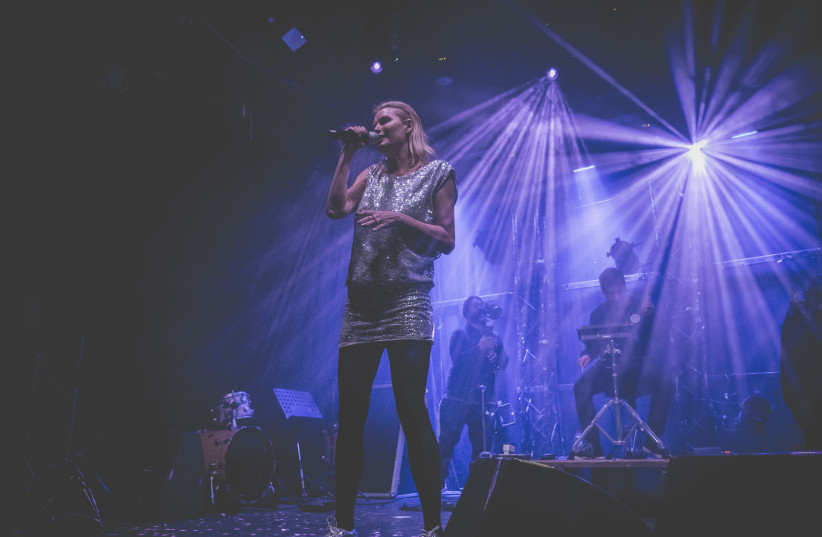German-Israeli pop sensation Sabina has straddled her seemingly conflicting identities since childhood. Growing up in Stuttgart, Germany, Sabina’s identity as a German Jew was shaped by the intergenerational experiences of her father, who narrowly survived the horrors of the Holocaust and remained part of the small but close-knit remnant of the once abundant and rich Jewish culture that permeated much of Europe.
Speaking from her home in Tel Aviv, where she lives with her partner and two young children, Sabina reflects on her childhood.
“There were maybe one or two other Jewish children in my school. My parents didn’t mingle much with a lot of Germans; [when they did it was] mostly for business, but not on a social level because probably either their parents or grandparents were the ones who committed those atrocities.” Sabina explains that this made her very shy and reluctant to express her identity as a child in Germany.
“I felt very isolated, like a stranger in my own land. You want to belong to the place you were born and where you live, but on the other side, you don’t want to lose this important part of yourself, your Jewish identity.”

From a young age, Sabina had always dreamed of being on stage, but her parents did not share the same passion for her artistic talents. Hoping to connect her to her Jewish roots, Sabina’s parents encouraged her to study at an Israeli boarding school at the age of 15. But the blond-haired, blue-eyed singer found herself even more conflicted, with many Israelis constantly asking if she was even Jewish. It was an unusual paradox, having to keep her Jewish identity subdued in her native home of Germany while being challenged for that very same identity in Israel. For Sabina, this contradiction opened up an internal dilemma about how Jews in the Diaspora can become their authentic selves.
After nearly a decade in Israel, Sabina decided to explore her passion for the arts, enrolling in an evening acting program in Tel Aviv. Having fallen in love with the stage, she was soon accepted to the prestigious Lee Strasberg Theatre & Film Institute in Los Angeles, excelling in both stage and vocal performance.
While life in Los Angeles afforded Sabina the opportunity to experience a more robust Jewish community outside of Israel, there was still something missing in her life, so she returned to Israel in the hope of starting a family. “I always came back to Israel; it is a place I always considered to be the most like home,” explains Sabina, whose parents had instilled a set of familial values reflected within Israeli society.
“When I started working as an actor, I did not have a lot of confidence because I came from a home that was not so supportive of my career. It took a lot of strength to build up this confidence to stand up on stage in front of so many people, but this is something I needed to do for myself.”
<br>Merging European roots and Jewish identity
In 2009, after arriving back in Israel, Sabina’s father called her, breaking the troubling news that he had developed cancer and was given just six months to live. Suddenly, she was flooded with memories of her complex relationship with her father – his anger after the war, stonewalled personality, and conflicted identity as a European Jew and Holocaust survivor.
While enjoying one of their final meals together at a high-end restaurant in Switzerland, Sabina was at a loss for words as she gazed into the face of the man who had been to hell and back to give her the opportunity to find her true authentic self. Staring at the pianist in the middle of the crowded room, Sabina mustered up the courage to ask him if she could sing a song for her father. Almost like in a movie, Sabina serenaded her father in front of the entire restaurant as tears rolled down his face.
“It was in that moment that he hugged me tightly, and I have never seen him so moved by me doing something artistically,” Sabina shares, attributing her late father as an inspiration for her budding career more than a decade later. “A year after he passed, I began writing, and in 2012, I went into the recording studio for the first time and loved it.”
The loss of her father was devastating for Sabina, but at the same time, there was a certain freedom from severing that tether to the traumatic experiences of the Holocaust that her father had held onto so closely. Uninhibited and looking toward the future, Sabina has now created a new mission to act as a bridge between cultures, using the medium of music to bring the values of her Israeli identity to the hearts and minds of the European public.

Merging her European roots and Jewish identity, singing in German, English, French, and Hebrew, Sabina finally found her voice and her identity in the intersection of these cultures. Shying away from her introverted childhood and conflicted internal identities, Sabina’s lyrics, most of which she writes herself, are based on her real-life experiences. Inspired by her journeys around the world, the people she has met, and musical performances she has experienced, Sabina masterfully blends the beauty of cultural diversity through her songs – a raw and authentic expression of her own kaleidoscopic perspective on life.
Her first studio album, Purple Ribbons, was released in 2019 and is a more melancholic collection of songs in English from her childhood. She is preparing to release her second album, which is entirely in Hebrew and fuses together more upbeat rhythmic pop.
TODAY, SABINA is taking her platform to the next level, using her medium to share messages of love and hope with audiences around the world. Reflecting on the power and impact of song, Sabina feels that “music is something that is universal. At the end of the day, most people just want to spread love. When you are at a concert, it puts you in the moment, and you forget about everything else. For one or two hours, you are really present. It can be happiness and sadness all together, and the release of those complex emotions. Music is something that connects people together, and I feel very proud of my heritage at this sensitive time, representing Israel and performing in German.”
While Sabina has always had mixed feelings about her German heritage, in the aftermath of October 7, she has found a new appreciation for her mixed roots, taking pride in the support that the German people and government have demonstrated for Israel.
Her earlier single, “I Wish,” was originally written in English and has now been translated into German as a homage to her father. It reflects her longing to be with him and going to his home to look for him. In the aftermath of Oct. 7, those lyrics have taken on a different meaning, reflecting the pain of thousands of Israelis, including the families of the hostages, the victims of the devastating attacks, and the parents whose children serve on the front lines in Gaza or the Northern Border.
“I am showing the two sides of me, the German side and Israeli side, and I understand both sides,” Sabina proudly explains, finally finding the meaning of her dual identity that challenged her for so many years.
“What people see in the media is very different than the reality, and I hope to share the truth about Israeli society. I want the world to better understand the importance of the State of Israel for the Jewish people.”
Sabina will take part in Joint Perspectives - A German-Israeli Summit. Click here to learn more.
Sabina’s wardrobe in photographs provided by Maskit.

